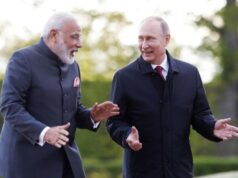During Indian Prime Minister Narendra Modi’s recent visit to Washington, President Donald Trump displayed a firm stance on tariffs but showed openness to deeper coordination on other strategic issues.
Arun Kumar Singh is one of India’s top diplomats, who served as Ambassador to Israel, France and the United States, apart from holding other senior positions in the Ministry of External Affairs in Delhi and abroad before retiring.
In an interview to The Gist, he argues that apart from the “substantive outcomes” related to technology, military and defence cooperation, the meeting between the two leaders sends out a clear signal to the new administration that he values the relationship with India.
Trade and tariffs remain critical points in Indo-US relations, with the Trump administration repeatedly emphasizing concerns over high Indian tariffs on key American exports. Just before Modi’s arrival, President Trump signed an executive order directing a review of reciprocal tariffs on imported automobiles. Though not targeted specifically at India, the timing sent a clear message.
Despite this, the visit resulted in an agreement to initiate negotiations for a bilateral trade agreement, with an initial tranche expected by fall. If successful, such negotiations could alleviate pressure on India concerning reciprocal tariffs.
Additionally, the joint statement outlined an ambitious target of increasing bilateral trade to $500 billion by 2030, more than doubling the current levels.
A significant area of convergence was military cooperation. The US has signalled its willingness to enhance high-technology defense exports to India, including the potential supply of F-35 fighter jets. Though India has not formally requested the aircraft, this reflects Washington’s readiness to elevate India to a higher tier of strategic defence cooperation.
The Trump administration also reaffirmed its commitment to fostering defence technology partnerships, building upon previous agreements like the release of 80% of technology for the GE F414 fighter jet engine.
The renaming of the Biden-era initiative on critical and emerging technologies to TRUST (Transforming the Relationship Utilising Strategic Technology) further indicated continuity in bilateral cooperation. This initiative will focus on artificial intelligence, quantum computing, biotechnology, semiconductors, space, and defence sectors.
Ambassador Singh highlighted that India-US relations have steadily strengthened under successive administrations, whether Democratic or Republican. While Trump has shown unpredictability—such as his willingness to mediate in India-China and Kashmir disputes—India has consistently reinforced its position against external mediation.
Trump’s moves to withdraw the US from global institutions like the WHO and the Paris Climate Agreement could impact India. However, Singh suggested that India should proactively pursue its climate and global health agendas, forging alliances with European nations to mitigate any fallout.
The discussion also touched on India’s diplomatic balancing act. While the US remains India’s most crucial strategic partner, Singh emphasised that India must maintain strong relations with France and Russia. France, in particular, has been a consistent ally in defence, civil nuclear, and space collaboration, while Russia remains a key partner in energy and military cooperation.
Singh dismissed the notion that India had to downplay any defence deals with France ahead of his Washington to avoid annoying Trump, stating that India should pursue agreements in its best interest, irrespective of US reactions.
Trump’s suggestion of a potential deal with China raised concerns over India’s strategic standing. However, Singh noted that despite tactical agreements, the US perceives China as its primary economic, technological, and military competitor. Given India’s skilled workforce and growing technological capabilities, Washington continues to view India as a crucial partner in countering China’s global influence.
Tariffs aside, the Khalistan separatist issue remains a point of friction, with India seeking stronger US action against those attacking its diplomatic missions. The joint statement condemned activities that threaten territorial integrity, though implementation remains a key test.
Regarding deportation and extradition matters, Singh agreed that India is willing to take back verified Indian nationals. He noted that India’s concerns were not about deportations per se, but about the manner in which they are conducted, particularly the use of military aircraft and shackling of deportees, which has created diplomatic tensions.
Prime Minister Modi’s visit to Washington reinforced the growing India-US partnership, balancing trade disputes with deeper military and technology collaborations. While political and policy differences over issues like tariffs remain, both nations appear committed to strengthening ties amid a shifting global landscape, he concluded.
Watch the full interview to get more insights into what India can expect from Trump’s second term in terms of not just trade and tariffs but a lot more, from a veteran diplomat who has served as India’s top diplomat not just in the United States, but also France and Israel, two other key Indian allies.
In a career spanning three decades and counting, Ramananda (Ram to his friends) has been the foreign editor of The Telegraph, Outlook Magazine and the New Indian Express. He helped set up rediff.com’s editorial operations in San Jose and New York, helmed sify.com, and was the founder editor of India.com.
His work has featured in national and international publications like the Al Jazeera Centre for Studies, Global Times and Ashahi Shimbun. But his one constant over all these years, he says, has been the attempt to understand rising India’s place in the world.
He can rustle up a mean salad, his oil-less pepper chicken is to die for, and all it takes is some beer and rhythm and blues to rock his soul.
Talk to him about foreign and strategic affairs, media, South Asia, China, and of course India.




